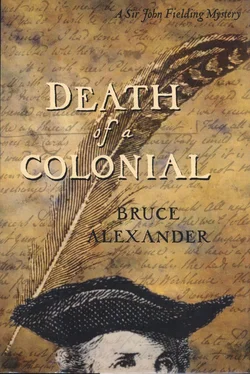Bruce Alexander - Death of a Colonial
Здесь есть возможность читать онлайн «Bruce Alexander - Death of a Colonial» весь текст электронной книги совершенно бесплатно (целиком полную версию без сокращений). В некоторых случаях можно слушать аудио, скачать через торрент в формате fb2 и присутствует краткое содержание. Год выпуска: 1999, ISBN: 1999, Издательство: Putnam Adult, Жанр: Исторический детектив, на английском языке. Описание произведения, (предисловие) а так же отзывы посетителей доступны на портале библиотеки ЛибКат.
- Название:Death of a Colonial
- Автор:
- Издательство:Putnam Adult
- Жанр:
- Год:1999
- ISBN:9780425177020
- Рейтинг книги:3 / 5. Голосов: 1
-
Избранное:Добавить в избранное
- Отзывы:
-
Ваша оценка:
- 60
- 1
- 2
- 3
- 4
- 5
Death of a Colonial: краткое содержание, описание и аннотация
Предлагаем к чтению аннотацию, описание, краткое содержание или предисловие (зависит от того, что написал сам автор книги «Death of a Colonial»). Если вы не нашли необходимую информацию о книге — напишите в комментариях, мы постараемся отыскать её.
Death of a Colonial — читать онлайн бесплатно полную книгу (весь текст) целиком
Ниже представлен текст книги, разбитый по страницам. Система сохранения места последней прочитанной страницы, позволяет с удобством читать онлайн бесплатно книгу «Death of a Colonial», без необходимости каждый раз заново искать на чём Вы остановились. Поставьте закладку, и сможете в любой момент перейти на страницу, на которой закончили чтение.
Интервал:
Закладка:
“Quite understandable,” said Sir John. “Since you were nearly a prisoner, it would not have done to anger your guard.”
“In fact, I was planning my escape. That was the point at which I had arrived, when Bolt took it upon himself to knock your young assistant here over the head and haul him back to Sir Patrick’s. He had been angered by our treatment by the young scholars at a — ” Sir John raised a hand to silence Mr. Mobley. “I fear I know the circumstances all too well. Jeremy gave me a full report on his abduction. He went as far as to credit you with his rescue. For that I am greatly beholden to you. Nevertheless, the fact remains that you are here making a statement regarding a homicide. Let us get on to that, if you please.”
“But, sir,” said Mr. Mobley, “while you may know that it was I who set the lad free, you do not know what moved me to do it, Sir Patrick had sent the drunken Bolt to bed in disgrace, but then he had discussed with me just what was to be done with the lad. He gave it as his opinion that it might be necessary to ‘remove’ him. I pointed out that he was Sir John Fielding’s boy. ‘Yes,’ said he, ‘that makes it all the more necessary and all the more unfortunate.’”
Sir John turned in my direction. “Do you hear that, Jeremy? Your demise was at least considered ‘unfortunate.’”
“Yet nevertheless ‘necessary,’” said I.
“As you will. But now, Mr. Mobley, you must bring us to date.”
“My appearance before the commission was, as all the rest of it, a scheme of Sir Patrick’s devising. I had not even known that such a body existed; I learned from Sir Patrick that he had organized it himself purportedly in the Kings service, hoping to use it so as to have a listening post in the enemy’s camp. By the time I was instructed by him to write that letter, I believe he was quite despairing of the success of our entire enterprise. Bolt had become unreliable, and he must have perceived quite rightly that I was looking for an opportunity to get back to the colonies. For myself, an appearance before the commission would take me to London, where escape would be easier to accomplish.
“Well,” he continued, “in the event, I believe I did well enough in the first part of the interrogation — ”
“Oh, you did very well indeed, ‘’ Sir John interrupted. “In fact, the commission was quite ready to disband when you left the room. The last thing they would have wished was to contest the claim in court so that you might have the opportunity to appear before a jury.”
“But then was the second part,’’ said Mr. Mobley, “and that fiend of an old fellow. What was his name? Ah, yes, Inskip. I remembered at last that I had been advised to avoid him at Oxford because of his merciless manner. He was evidently notorious about the university for just the sort of bullying he gave me. I was so destroyed by him that I wanted nothing more than to get away, so I made my little speech and left.”
“Rather hurriedly,” said Sir John.
“Yes, I wanted to leave my dreams of vainglory behind with Sir Patrick. I saw it as my chance to escape.”
“Yet Sir Patrick went running after you, did he not?”
“He did, and he lectured me and threatened me. In reply, I did little more than repeat what I had said within, though with a few more colorful turns of phrase. I told him also that if he tried to stop me, I would tell all and name him as leader of our conspiracy. It seemed to me as I left him standing and looking after me in Bloomsbury Square that there was little he could do, yet I underestimated him.”
“Get on with it,” Sir John urged. “Get to Eli Bolt.”
“Yes, indeed I shall, “ said the other. Yet he sighed deeply, unwilling to be pushed, before he resumed: “I walked about, attempting to organize myself, and decided that I must return to the Globe and Anchor, for there were certain personal items I did not wish to part with. And why should I leave London with no more than the clothes on my back? And so I returned to the hostelry.”
“Did you expect trouble?”
“I was prepared for it. As I was about to enter the room, I had a sudden vision of Bolt on shipboard, tossing that loop of rope again and again with great accuracy. And that, sir, was what saved me. The room was by then quite dark, near dark as pitch, when I kicked the door shut behind me. But as I did so, I put my right hand up before my face, and only an instant later I felt something light brush my ear and touch my cheek. My hand shot up and brushed that something away. Thus was I saved from strangulation. The noose was well tossed, but I managed to throw the rope off before Bolt could pull it tight. Yet I followed it back, pulled him to me — and we fought. Dear God, how we fought! With our fists, with our feet — we kicked and wrestled and scratched and rolled about on the floor and crashed against the walls. I could not have bested Bolt in his prime, but he was long past that. Drink and riotous living had weakened him. He lacked both strength and endurance. I was the younger, and I knew that I was fighting for my very life.
“The noose was still in my hand, or to tell it true, it was looped about my wrist. I had knocked Bolt to his knees and threw the noose round his neck. I warned him that if he offered further resistance, I would pull it tight. Yet Bolt attempted to throw me off his back, to turn and wrestle me down, and so I gave a good, sharp tug on that leather rope, but then I relaxed it when a horrible noise came from him down on the floor. He struggled to breathe, but finally lost the battle. I loosed the noose — but too late. I had cut his windpipe. The man was dead. “
Percival Mobley had, in the telling, become so exercised in an emotional manner that with those last few solemn words, he collapsed beneath the great burden he bore and began to weep.
“So,” he said to Sir John when he was able, “it was not my intention to kill him. I wished only to force him to quit trying to kill me ”
“ Then you would deny the charge of murder but are prepared to plead guilty to manslaughter?”
“If I must, I suppose I do.”
TWELVE
It took nearly a day but by the end of it, word had circulated through London that a dead man, horribly beaten and strangled, had been discovered in a room in the Globe and Anchor hostelry, and that said room had been engaged by one Lawrence Paltrow. The dead man in the room was not Mr. Paltrow.
The city quite hummed with the news, for it was known to a few that this same Lawrence Paltrow was engaged in a claim upon the Laningham title and its great wealth. The few that knew this told only their most intimate friends, and soon thousands were informed.
What surprise when the drabs, layabouts, and such who were the regular attendants of Sir John Fielding’s court at Number 4 Bow Street heard this same Mr. Paltrow summoned before the magistrate by the court clerk! The individual who came limping up in response was all bruises and plasters, one whose right eye was swollen shut, yet one still capable of speech, as he proved in a most interesting exchange with the magistrate. As the story was told, it went something like this:
“This is a case of homicide, sir, and a very serious matter,” said Sir John. “How do you plead, Mr. Paltrow?”
“Why, how I plead is my own matter, sir, until you address me by my proper name.”
“What’s that you say? Are you being impertinent, sir?”
“That is not my intention. Nevertheless, Lawrence Paltrow is not my proper name.”
“And what is it, then?”
“Percival Mobley.”
At that, a great hubbub erupted in the courtroom. Though none there were acquainted with that name, nearly all knew the name Paltrow. It was that of the Laninghams, a family that had already provided the public with one murderer and two or three street ballads celebrating his deeds and death. Homicide seemed to run in the blood of the Paltrow clan. They had hoped to have their expectations satisfied by some dark revelation of a distant ancestor’s pact with the Devil which exacted homicides from each successive generation. A rumor to that effect had raced through the city as soon as it became known that the dead man had been found in a room let to one bearing that surname. And so there was a definite air of disappointment to the comment of the crowd there in the courtroom, a sort of chorus of grumbling. It was easily silenced by Sir John; it took only three good whacks of his gavel to restore order.
Читать дальшеИнтервал:
Закладка:
Похожие книги на «Death of a Colonial»
Представляем Вашему вниманию похожие книги на «Death of a Colonial» списком для выбора. Мы отобрали схожую по названию и смыслу литературу в надежде предоставить читателям больше вариантов отыскать новые, интересные, ещё непрочитанные произведения.
Обсуждение, отзывы о книге «Death of a Colonial» и просто собственные мнения читателей. Оставьте ваши комментарии, напишите, что Вы думаете о произведении, его смысле или главных героях. Укажите что конкретно понравилось, а что нет, и почему Вы так считаете.












